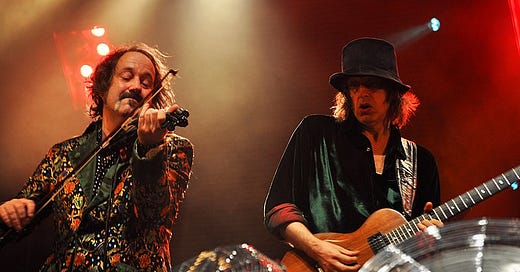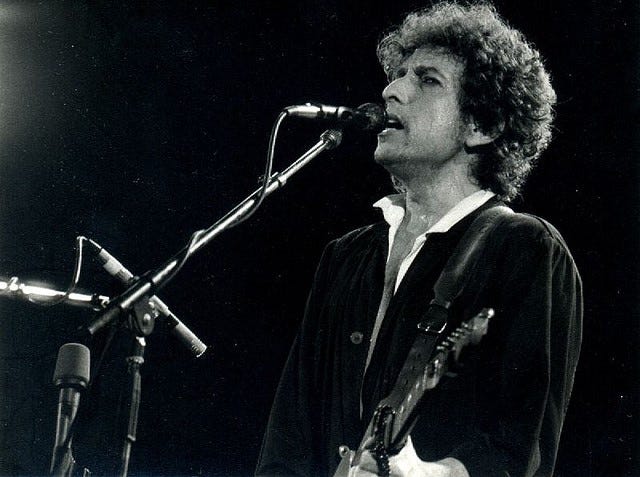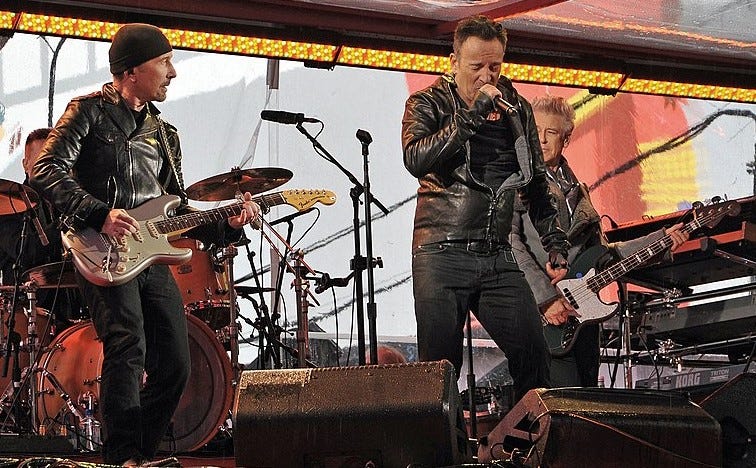I said when I started this Substack that I would occasionally step away from the Wokeface to offer something cheerier...and this is the second of those. With the Season of Good Cheer almost apon us, this month I share my thoughts about Rock music. But if this is a subject that is just not for you then be assured I’ll be back in the New Year with my more usual fare.
Why write about Rock music? Well from the age of 14 to about 50, this was a big thing in my life. Borderline obsessed I was in fact; right up ‘till my mid-thirties....writing songs; trying to assemble a band and all. [In my teens I wanted to be the next Bob Dylan or Leonard Cohen.]
So in the essay that follows, I ask this question: How can we decide what (if anything) qualifies as great art in the vast archive of recorded popular music? For a really deep dive into questions of artistic quality - whether in music, in literature or in painting - Schopenhauer’s famous tome The World as Will and Representation is the place to go but my little essay here will remain in the shallower waters of whether any popular music of the late 20th c. qualifies.
Ideally I would have liked to have stretched the scope of my essay all the way back to recorded popular music’s early 20th c. beginnings but although I love the music of the Jazz/Swing era (and some of the post-war crooners) I just don’t have the same depth of knowledge as I have of Rock. I’ve also dated my brief history of Rock from my own ‘coming of age’ in the early 60s - but that doesn’t mean I am oblivious to its beginnings in the 50s.
How can we decide what (if anything) qualifies as great art in the vast archive of recorded popular music?
When it comes to attitudes to Rock music, people seem to divide into three camps in my experience:
· those who dismiss the whole lot of it as undifferentiated trash - as if Western music’s deep reservoir of creativity somehow ran dry in the middle of the 20th century.
· those who tend to mostly just like the latest stuff.... and Rock’s back catalogue quickly recedes from their conscious memory.
· and lastly, those like me who think that most of it has always been trash but the very best does deserve a place in a kind of Classical Rock Cannon. (No less so than - for instance - the much admired Baroque madrigals or the folk songs of Vaughan Williams.)
Frustratingly those of us in this last camp never seem able to agree what should be included in this Rock Cannon and, for this reason, I’ve left it ‘till late in the essay to give any examples of my own choices.
My Back Pages as a teenager
October 2022 was the sixtieth anniversary of a song that ignited the extraordinary – and at times hysterical – global pop phenomenon that has since come to be known as Brit Pop. I first heard the song, aged twelve, on Radio Luxembourg as it came crackling out of the raffia speaker panel on our walnut-veneered radiogram. Love Me Do - The Beatles’ first UK hit - is, in itself, nothing special. But it was that spark. By early 1964 the British Invasion of the USA was underway. She Loves You was topping the charts simultaneously right across the Western world. The following year I Can’t Get No Satisfaction was doing the same. Tuning in on Thursday night to the BBC hit parade show Top of the Pops had become, for every British teenager, a once-week tv Scale A parade.
The hitherto all-dominant American pop industry greeted this British Invasion with shock and disbelief. The Brits?... rockin’ and rollin’?...Whaat! Head-scratching, almost wounded dismay was an initial reaction; one captured some years later in Don McClean’s American Pie. But from the mid 60s on, the pop industry on both sides of the Atlantic came to be mutually energising; exploding exponentially into the cultural tsunami that was (is?) Rock/Pop Music.
What songs will endure when all rock’s ephemera evaporates into the mist of time?
For most people all this is a big thing in their lives in their teens and twenties; from then on interest wanes. Those for whom this phase ran its course at anytime in the 60’s to 90’s tend to think of themselves as having been around for the best of it. If the thee billion plus hits on Spotify’s most streamed songs is the measure, you could argue that it is now bigger than ever. But nobody seriously believes that any of them will go down in history as great ones. So what will? What songs will endure when all rock’s ephemera evaporates into the mist of time?
One song that many industry insiders think is the greatest pop record ever made was brought back into the media spotlight by the death, earlier this year, of sexy Ronettes lead singer Ronnie Spector. Its release in 1963 is another deeply-etched memory of my early teens: I’m in my bedroom and Be My Baby - early Phil Spector Wall of Sound - comes blasting out of our new portable Radio Rentals transistor. It sent sensual ripples all down my spine and amazingly still does almost sixty years later. There are no poetic lyrics; no obvious musical sophistication so it is ripe for discarding as trash. What it does have though is a radically new kind of electronic orchestration with a visceral emotional power and strange beauty of its own.
In decades to come, when the rock/pop era has become just something that old people go on about (and when it has ceased to be a Mickey Mouse degree course for the academically challenged) a proper historical perspective might begin to emerge. In that historical reckoning, two remarkable aspects are likely to stand out:
· Firstly, the hitherto unimaginable quantity of this new medium of entertainment; now around 60 million songs and counting. This has created a problem for even the most determined devotee. With classical music one can, with sustained effort, gradually acquire some kind of basic overview. Not so with Rock. It takes a tenacity bordering on OCPD to be prepared to pan the never ending stream of new releases on the slim chance of finding a new musical nugget.
· And secondly, the emergence, during the mid to late 60s, of a new conception whereby a small part of this vast outpouring came to be accorded a status as not mere ephemeral entertainment but as an art form. An art form complete with designations of musical genius and lyrical profundity. (1962 also marks the sixtieth anniversary of the release of Bob Dylan - the first album by the man, more than any other, associated with this idea of rock music as Art.)
…..the emergence, during the mid to late 60s, of a new conception whereby a small part of this vast outpouring came to be accorded a status as not mere ephemeral entertainment but as an art form
I believe that a small number of rock’s back catalogue – very small, maybe 600 out of the 60 million – will indeed endure as great music. Also that, when future generations come to curate the poetic muse of the late 20th century, it is the best song lyrics that will stand the test of time much more than the ‘poetry’ of the era. (There are currently more than one hundred English language poetry magazines. The most established are accorded a respect in literary circles that seems to inoculate them from worrying about the indifference of the wider educated public. Many of the smaller ones, with a readership perhaps approaching zero, nevertheless take themselves very seriously and exult in their esoteric au courant judgements about what makes a great poem.)
The big problem though with rock/pop as Art comes with trying to actually pan the gold dust out from the 60 million babbling brook. That tiny proportion of truly great music has fallen victim to a kind of category error, having no unique generic label to differentiate it from the rest.
In theory, Rolling Stone magazine’s 500 Greatest Songs of All Time would be the answer. It is, after all, a composite distillation of the individual ‘top 50’ voted by a kind of rock cognoscenti of industry insiders; artists, music critics etc. But when you remember that this is the aggregated judgement of an ‘industry’ driven by a default imperative to breathlessly and endlessly enthuse about every new release - the vast majority of which are worthless trash - it doesn’t inspire much confidence
How about narrowing the field down to just the oeuvre of ‘serious’ rock artists? That approach hits another problem. Anyone with an enduring interest in Rock knows that a very large proportion of great records are in fact one-hit wonders. Also the output of even the most celebrated artists is invariably patchy; including plenty of dross, particularly after their early heyday years.
OK...time now for a few random examples of songs I would choose for my own ‘500’ - just humbly offered as a shuffle through my personal tastes so please don’t phone in!: Boy in the Bubble ; Desolation Row; Sultans of Swing; Hungry Heart; Boys of Summer ; I Still Haven't Found What I'm Looking For; Fast Car; Season of Hollow Soul; Don't Go To Strangers; McArthur Park, Death of a Ladies Man; Both Sides Now; Television Antichrist Blues; Fisherman's Blues.
The above are all in the ‘serious’ folk-rocky genre but the greatest musical gems have not all been songs with poetic lyrics (or blues numbers dripping ‘authenticity’). The production/sound engineering revolution kicked off by Spector rarely gets a mention alongside song writing, musicianship and performance but is arguably the late twentieth century’s truly distinctive contribution to musical creativity. Go Your Own Way; Love is a Stranger; Baker Street; Is This Love; Heart of Glass; Thank U and Pride (In the name of Love) are just a few fine examples of the creative fusion of songwriter, performer and recording engineer.
In similar vein my teenage years saw the emergence of Tamla Motown; ‘commercialised’ blues and gospel with a scattering of gems in its back catalogue of punchy love songs written by (recently deceased) Lamont Dozier together with the Holland brothers. Tamla laid the foundations for the occasional exquisitely engineered Dance and Disco music of the ‘70s and ‘80s. I Wanna Dance with Somebody sung by Whitney Houston (but engineered by Narada Michael Walden) is an example as good as it gets.
OK enough anyway of my own tastes. Any other takers for curator of a Time Capsule of Precious Rock? I’d love to hear?
The above text is adapted from articles I wrote for The American Conservative and The Critic: https://www.theamericanconservative.com/imagine-theres-no-muzak/ and https://thecritic.co.uk/top-of-the-pops/









I liked most of your choices; many are favorites. I stood in line to see "Help" and "A Hard Day's Night" in the local theater. I was in second grade but everyone loved the Beatles! I still love the Beach Boys. Going through my teen years in the 70s meant Led Zeppelin and Pink Floyd for me and my friends, which really freaked my dad out. The most important part was the music; the lyrics I could take or leave. It was always the music and still is. Thank you for the trip backwards. I really enjoyed it (obviously) and am looking forward to your next column.
I was 12 when The Beatles sang "She Loves You" on the Ed Sullivan Show. I'll never forget how I felt that night; that the world was about to change.
How about:
Pink Floyd's euphoric "Great Gig in the Sky" https://youtu.be/T13se_2A7c8?si=54sAI3WdEmKhA308
Scott McKenzie's anthemic "San Francisco" https://youtu.be/7I0vkKy504U?si=sUgxtefZ9f2ox2JE (now a requiem for what's been lost).